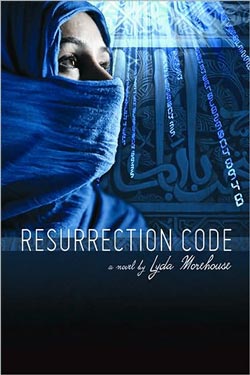Lyda Morehouse’s AngeLINK novels are some of the most insanely inventive books I’ve ever read. They’re a spicy brew of urban fantasy and cyberpunk, nanotech hacker adventures fused with end of the world prophecy, books where artificial intelligences rub virtual elbows with the Archangel Michael and where cyborg priests from the Inquisition have taken over international policing duties from Interpol.
It is no wonder to me that these books have built an intensely loyal fan following over the years. Appetite for stories set in this universe did not diminish when the series finale, Apocalypse Array, was released in 2004. Over the years Morehouse has fed readers morsels of short fiction that expand and embellish her storylines and her characters’ history. Now, with the release of the so-called AngeLINK prequel, Resurrection Code, we get our first full meal in almost a decade.
So-called? Yes. Resurrection Code is the origin story of Mouse, a street kid turned hacker who democratized internet access after it had been restricted to well-off and law-abiding members of society. And Mouse’s early days do come well before the events of the first book, 2001’s Archangel Protocol. But this story shuttles between two timelines: it follows Mouse as a boy and as an old man. The novel comes before and after the four-book series that preceded it: old Mouse, you see, is seeking to redeem the great wrong he committed back in those starving boyhood days.
His look back begins with a search for the enigmatic Mohammed, an old friend from the dark period after the Aswan Dams burst and Cairo was left mired in disaster, without electrical power, web access, or effective foreign aid. This quest leads him directly to one of my favourite AngeLINK characters… Morningstar.
Resurrection Code unspools in three parallel threads, as Mouse and Morningstar recall Cairo’s crisis and their own past mistakes, all while attempting to contact Mohammed in the present. The task is complicated by the fact that they aren’t the only ones looking. Important entities want their friend dead. But can either of them hope to earn the trust—and thereby save—a person they betrayed so many years ago? And can either live down their reputation? Mouse is a famed international criminal, after all, and Morningstar is, of course, the devil himself.
Call him what you will—The Angel Lucifer, Satan, Ol’ Scratch—Morningstar is one of literature’s most complex and intriguing entities: to write him into a book is ambitious, the literary equivalent of taking on the lead in King Lear. Morehouse’s take on Morningstar never fails to fascinate me. Some elements are absolutely classic—the ambivalent feelings about his Creator, for example, and the way there’s always a trick up his well-turned sleeve. But this fictional incarnation of Morningstar is appealingly vulnerable. He is at once an obedient tool of his maker and a rebel to the core.
Resurrection Code is very much taken up with the binary we humans impose on gender, the idea that everyone is either 100% male or female, and the price these culturally imposed roles exact on those whose identity is more fluid. This future world is one of considerable intolerance, where transphobia flourishes to the extent that it is illegal for people to do anything that might smack, even mildly, of cross-dressing.
The book is meant to stand on its own, without reference to the earlier AngeLINK books, but I can’t stand back far enough from it to say how well it succeeds. Having read the novels, I am reminded of them constantly; this book is enriched by them, and it shines up my memories of its predecessors. This entire universe is lit with odd, heretical magic, and I’d be interested to hear from someone who comes to Resurrection Code fresh and unspoiled. My guess is such readers will enjoy the experience well enough, but may promptly go in search of the other novels.
What is certain is that it was a great world to revisit. Morehouse’s peculiar gift in this series is that she makes the Apocalypse—in all its blood-drenched terror-somehow also feel beautiful, necessary and perhaps even right.
A.M. Dellamonica writes novels and short fiction and teaches writing online. She is passionate about environmentalism, food and drink, and art in every form, and dabbles in several: photography, choral music, theater, dance, cooking and crafts. Catch up with her on her blog here.










